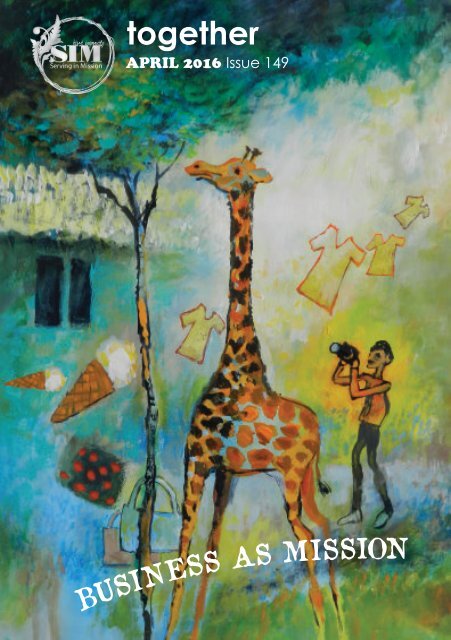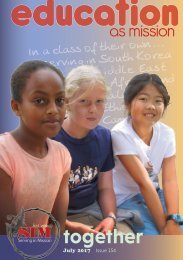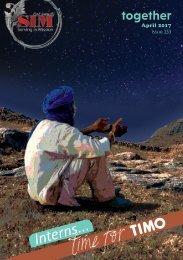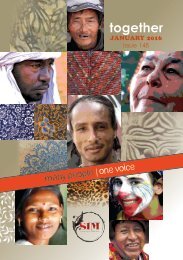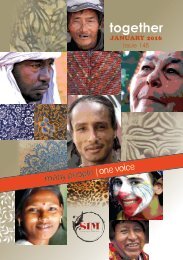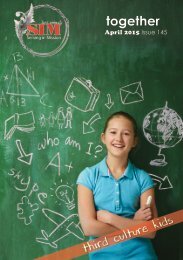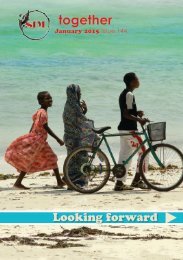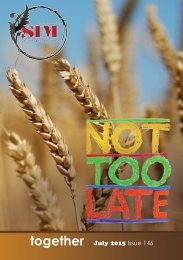onlineversion mag 149
Create successful ePaper yourself
Turn your PDF publications into a flip-book with our unique Google optimized e-Paper software.
together<br />
APRIL 2016 Issue <strong>149</strong><br />
BUSINESS AS MISSION
SIM and MECO International<br />
join hands in the Middle East<br />
Official publication<br />
of SIM New Zealand<br />
(Serving In Mission), an<br />
inter-denominational<br />
evangelical Protestant<br />
mission.<br />
Editor: Zoë Cromwell<br />
For security reasons<br />
some contributors may<br />
use pseudonyms. Stock<br />
photos are sometimes<br />
used to help represent<br />
stories. Except for stock<br />
photographs, all i<strong>mag</strong>es<br />
copyright ©2016 SIM<br />
and its licensors. All<br />
rights reserved. SIM<br />
New Zealand (#CC28002)<br />
is a registered charitable<br />
entity in terms of the<br />
Charities Act 2005.<br />
For more information,<br />
visit the Charities<br />
Register at www.<br />
charities.govt.nz<br />
SIM New Zealand, PO<br />
Box 38-588, Howick,<br />
Auckland, 2145<br />
Phone: 09 538 0004;<br />
Freephone:<br />
0508 47 46 69;<br />
Email:<br />
nz.info@sim.org<br />
Office: 12B Picton Street,<br />
Howick,<br />
Auckland, 2014<br />
In a region with one of the biggest<br />
gospel opportunities of our generation<br />
this new initiative will seek to put more<br />
workers into Middle East countries.<br />
SIM and MECO believe that together<br />
they are far better able to take the<br />
good news of Jesus to where he is least<br />
known than either could have<br />
done individually.<br />
(See page 17 for the news release)<br />
Also in this issue:<br />
• Stories about the use of business as mission;<br />
for example, enabling workers to be in places<br />
that are otherwise closed. They offer exciting<br />
new opportunities for mission partners, often<br />
in places that SIM hasn’t been before.<br />
• There’s a tribute to Joy Crombie’s life of<br />
service on page 11<br />
• We introduce the Hat people in Central Asia:<br />
10.6 million with no church.<br />
2
Around the world, people<br />
understand business and accept<br />
it as a basic human activity...<br />
what is business<br />
as mission?<br />
James and his wife thought starting an ice<br />
cream business in Central Asia was a good way to<br />
get a long term visa, but were soon struck by other<br />
benefits: relationships with staff, clients and suppliers were<br />
according to biblical principles; in a tense local inter-racial environment,<br />
they saw harmony between employees from different backgrounds; and<br />
importantly, the work supported their core ministry — the gospel.<br />
In India, the EC Group employs physically disabled people and Freeset<br />
employs women getting out of prostitution while introducing them to Jesus.<br />
Villagers in Fiji are being helped by missional business to market coffee that<br />
was found growing wild in the bush. Carlos and his wife went to West Africa as<br />
traditional mission partners, but seeing the poverty around them they realised<br />
that starting a business would help provide jobs.<br />
Other mission partners in other places have started fashion businesses,<br />
consultancies, hotels, a burger restaurant, textile factories and a photography<br />
business. A Business As Mission (BAM) initiative in Colombia formed a coffee<br />
co-op of previously rival farmers, and paid them fair trade prices. On page 4<br />
there’s an African safari business started by a SIM couple. Another story on<br />
page 7 describes the growing venture resulting from another couple going as<br />
pioneers to North Africa, starting a small art workshop in a bazaar.<br />
BAM can range from simple ‘tent-making’ to a big wireless<br />
tech company supporting a 400-member church that has now<br />
expanded from the Middle East to Asia. It can range from small<br />
companies launched with micro loans and donor gifts to large<br />
capital-based companies. There’s no one model of how it<br />
should be, and it will vary depending on the particular mission<br />
partners and the host country.<br />
Some say business as mission is the next wave of<br />
evangelism. Historically, the Moravians used it. William Carey<br />
mixed business with ministry. In the early church era the<br />
gospel was often carried by those seeking to do business.<br />
The bottom line for BAM: is the venture’s principal reason for existing the<br />
greater glory of God; to create an intentional platform for sharing the<br />
gospel and planting churches?<br />
3
Sometimes we struggle to i<strong>mag</strong>ine what kind of business mission<br />
partners could do, and how this might work in terms of the<br />
gospel. Here’s a creative example:<br />
Safari<br />
business<br />
in<br />
Tanzania<br />
My wife and I run a safari business in a remote area of Tanzania.<br />
The local community granted us some land next to a village, along a<br />
river. One of the country’s game reserves lies next to the property.<br />
It’s a typical day: our progress up river is considerably slowed by a<br />
line of hippos stretching from bank to bank. In the evening they are<br />
“book-ended” by a medium-sized elephant guarding our Land Cruiser,<br />
and a seemingly countless number of ants. The ants, affected by the<br />
temperature outside or a shift of the moon, flood into our house and run<br />
us out in the early morning hours. But by the time the sun has fully risen,<br />
they are gone.<br />
Although our village is isolated, the local government census tallies<br />
4,000 people. Between our family and the nearest mission partners, who<br />
live three hours away, are villages that are home to thousands of people<br />
who do not know Jesus. They are Muslim, but primal religion has mixed<br />
with it to form a folk Islam. Sadly, many are held in fear: afraid of life,<br />
4
afraid of death. Yet we serve the One who is greater than their fears. It<br />
has always been our ambition to preach the gospel where Christ is not<br />
known, so that we do not build on another’s foundation. About 99 percent<br />
of the people in this remote area do not know Christ. But God loves them<br />
so much that he sent his Son to save them. Through our ministry and<br />
presence, he has opened a door to proclaim this good news, a door that<br />
only he can shut. Although we live in a place darkened by witchcraft, false<br />
prophets and fear, we want to allow the Spirit of God inside us to direct us<br />
to the most immediate needs.<br />
We need Christian teachers!<br />
Our agreement with the community is that we will provide jobs.<br />
Because of this, our neighbours have a reason to interact with us every<br />
day. From the top chairperson of the village to youths looking for work,<br />
many come to us.<br />
Another promise we made was to one day open an English school<br />
on our land. When it opens, it will be in demand by every age group.<br />
Now we are praying for Christian teachers who will come serve with us<br />
… loving the students and developing the curriculum as they seek to<br />
establish God’s Kingdom. We want to transform the world by investing our<br />
lives in other lives. When the light of Christ burns brightly in our home,<br />
our light will catch others on fire.<br />
by a member of the SIM Tanzania team<br />
Go<br />
If you think God<br />
may be calling you<br />
to join this team,<br />
please contact<br />
nz.info@sim.org to<br />
discuss the possibilities.<br />
Or go to<br />
www.sim.org.nz<br />
and click on GO to<br />
find this or other<br />
teaching<br />
opportunties.<br />
5
Now we need<br />
pioneers in<br />
North<br />
Africa!<br />
It’s time for the Church to respond! How many Pauls and<br />
Timothys do we need in North Africa? How does SIM<br />
join with others, and where do we start in a region so<br />
vast? Consider these numbers:<br />
• 564 groups (199 million people) are ‘unreached’ — that is, the church<br />
comprises less than 2% of the population. That’s 89% of the people<br />
groups.<br />
• 351 groups (25 million people) are ‘unengaged’ — that is, they have no<br />
resident long-term church-planting witness living among them, leaving<br />
77% of people that the church so far has no presence among.<br />
SIM has explored parts of North Africa (NA), listening to the needs of national<br />
churches and international agencies, while praying for the Lord’s guidance as we<br />
step forward. This has led us to three regions.<br />
The first is in the Sahel/Sahara of Niger, where<br />
SIM Niger is now recruiting interns for desert work<br />
through a two-year on site training programme<br />
called TIMO. The second is in a NA country where<br />
links are being made with the indigenous church for<br />
theological and missiological training, so that they<br />
can extend their ministries and send out workers into<br />
the rest of the region.<br />
6
The third is in another country,<br />
where God gave a SIM couple a vision<br />
for ministry several years ago. That story<br />
deserves to be told:<br />
An arts business in the<br />
marketplace<br />
In 2007 “Don and Louise” knew that after<br />
twelve years it was time to relocate their<br />
ministry from East Africa to North Africa.<br />
One scorching hot afternoon, as Don and<br />
I stayed motionless beneath an overhead<br />
fan, he shared his dream of ministry and<br />
life in North Africa.<br />
Don rarely had the opportunity to<br />
use his artistic gifts but now he could<br />
see himself operating an art gallery as a<br />
missional business inside the old walled<br />
city. He pictured a workshop space where<br />
people could come, learn how to paint,<br />
make friends and be introduced to Jesus.<br />
He i<strong>mag</strong>ined his family living above the<br />
business. I was mesmerized.<br />
Don, Louise and their children<br />
realised that dream three years later.<br />
He opened an arts business with a<br />
partner and began to reach out into the<br />
neighbourhood. God used Don’s amazing<br />
relational gifts to meet artisans in the<br />
bazaar. He prayerfully sought out people<br />
of peace with whom he might develop<br />
business relationships, helping them<br />
export their products to various markets<br />
abroad. That led him into the desert,<br />
where he met the extended family of one<br />
7<br />
Pauls & Timothys<br />
SIM cut its teeth with “Pauls”,<br />
journeying up-river beyond the<br />
influence of settled missions to<br />
those who had never heard. Over<br />
ensuing decades “Timothys”<br />
faithfully served burgeoning<br />
churches until they became<br />
established church-planting<br />
entities. Today we are reaping<br />
the fruits of the third category of<br />
workers, those who have served in<br />
partnership with these churches,<br />
which are now sending people<br />
into cross-cultural settings.<br />
Now God is renewing SIM’s<br />
emphasis on those who are living<br />
and dying without hearing the<br />
gospel. This creates a passion for<br />
new initiatives. As a result, we<br />
have an escalating need for Pauls,<br />
who will pioneer, and Timothys,<br />
who will work to establish new<br />
churches.<br />
continues over the page u
of his business friends. Don always had a heart for nomadic peoples, and now his<br />
business had the potential to touch the desert from the heart of the city.<br />
In April 2013 we met up again. This time I was serving in my new capacity<br />
as Ministry Point Person for North Africa. I could see that although the work<br />
was not easy, they were buoyed by their faith and trust in God, who was clearly<br />
directing them. Don took me around the country, sharing his vision of what SIM<br />
could do there, and introducing me to potential ministry partners. Everything<br />
looked so good.<br />
Weeks later Don was diagnosed with pancreatic cancer, and the family was<br />
immediately jerked back to their home country. They were devastated, as were<br />
all whom they had touched in North Africa. Five months later God welcomed<br />
Don into paradise. The funeral was huge: it was easy to see that God had used<br />
him tremendously. His witness of Jesus Christ had impacted and transformed<br />
many lives. It is not easy or even possible to understand why God saw fit to take<br />
him, when ministry in this NA country seemed so dependent on Don and Louise.<br />
Three weeks before his death I needed to Skype with Don one more time.<br />
I was shocked at his gaunt appearance. It seemed he had aged 40 years in four<br />
months. Louise assisted him as he took the time he<br />
needed to get comfortable. After greetings, I said,<br />
“Don, you have shared a big vision for this country.<br />
Do you want me to continue with your vision?”<br />
He hesitated to gain strength, and then<br />
smiled, saying, “It would be foolish of you<br />
not to.”<br />
I wept as we prayed and said our goodbyes.<br />
Since then this particular country has been<br />
the focus of most of my work. We now have<br />
functioning partnerships with a few agencies<br />
and missional businesses. Last year three<br />
families arrived for long-term service, and<br />
there are another 50 ministry opportunities<br />
yet to be filled with our partners!<br />
We need creative Pauls and Timothys.<br />
We need trained professionals who can work<br />
as lead consultants for palliative care, for disabled<br />
youth and for people at risk. We need teachers for missionaries’ children’s<br />
...50 ministry<br />
opportunities<br />
yet to be filled by<br />
our partners<br />
schools, a visual artist and a videographer. We need people to come and train in<br />
country so they can do missional business.<br />
Our message is similar to Caleb’s: “We should go up and take possession of<br />
the land, for we can certainly do it.” (Numbers 13:30) God has called us. It is<br />
time to go. Let us pray and mobilise for this great opportunity.<br />
Author’s name withheld. Names on pages 7-10 have been changed.<br />
8
‘Lucas’ is<br />
continuing the<br />
business venture<br />
begun by Don in<br />
North Africa...<br />
He says: “In this<br />
country and others<br />
like it, many more<br />
godly business<br />
people are needed.<br />
People who will<br />
stick it out. People<br />
who are willing to<br />
invest deeply. People<br />
who are willing<br />
to put in the time<br />
to do business well,<br />
not as a necessity<br />
to get a visa, but<br />
as an avenue to<br />
meet and interact<br />
with a community<br />
of people in the<br />
struggles and joys,<br />
though authentic<br />
and openly shared<br />
lives.<br />
“As Paul said,<br />
‘I have become all<br />
things to all men<br />
that by some means<br />
I may win some.’ ”<br />
9<br />
not for the<br />
faint of heart<br />
“We have been here for two years now<br />
without Don and Louise,” Lucas says. “This work is<br />
hard — even harder without partners, but Don always<br />
challenged me to think bigger, go deeper, don’t take<br />
the easy way.”<br />
Lucas runs studio workshops several times a<br />
month teaching skills in photography and digital<br />
i<strong>mag</strong>ery but also has a commercial photography business.<br />
This way, many people come through the door<br />
and he meets a large cross-section of society, from<br />
creative types to managers and owners of companies,<br />
government officials and accountants.<br />
“It’s not for the faint of heart,” Lucas adds. “Things<br />
are not straight forward. They work on a different<br />
rhythm, sometimes different principles. We are able<br />
to reflect godly morals and business ethics.”<br />
When he’s asked, “Why are you still here, with all<br />
that is happening in this region?” he replies, “In the<br />
very beginning, we were excited about the possibilities,<br />
and felt like God was inviting us to locate our<br />
business in this place. After all that has happened I<br />
don’t feel God is calling me to leave yet ... He still has<br />
something for me to do here.<br />
“It is his work. The work of business, of helping<br />
people in this place to better their lives, of bringing<br />
peace to a troubled community, a troubled country,<br />
of seeing lives and hearts changed. It is ALL his work.”<br />
continues over the page u
Don’s vision was a workshop space where people<br />
could come, learn how to paint, make friends and be<br />
introduced to Jesus. Now SIM’s vision is a team that<br />
joins what God is doing in this North African country<br />
to his glory, through business and in other ways.<br />
Pray<br />
For the Lord to<br />
send workers whose<br />
pioneering hearts<br />
have been touched<br />
by the needs of this<br />
region<br />
Go<br />
Perhaps God is<br />
challenging you<br />
to consider a new<br />
ministry opportunity<br />
such as this?<br />
If so, please<br />
don’t delay. Contact<br />
nz.info@sim.org to<br />
discuss the exciting<br />
possibilities. Or go<br />
to www.sim.org.nz<br />
and click on GO to<br />
find North Africa<br />
business and other<br />
vacancies.<br />
10
Mother Joy: the nurse<br />
who was a ‘doctor’<br />
Joy Crombie’s life, 40-plus years of it in<br />
Africa and twice forced to leave countries<br />
where she worked by political upheavals,<br />
shows she was strong ... strong<br />
in faith and character, and physically.<br />
Once she did 111 tooth extractions in<br />
two days, and that takes stamina.<br />
Joy died in January aged 90. From a childhood where her parents didn’t<br />
approve of church, she began following Christ as a teenager and promised<br />
God at age 17 that she would be a missionary if he called her. She left her<br />
office job and trained as a nurse, then did two years Bible training.<br />
Going with SIM to Ethiopia, Joy worked as a nurse but said, “Basically<br />
I did the work of a doctor.” Once in one of the country areas where Joy<br />
spent most of her time a young man involved in a shooting accident was<br />
brought to her. It had happened a week before and gangrene had taken<br />
hold. To save his life she amputated his leg. Another time some parents<br />
repeatedly begged Joy to operate on their daughter’s cleft lip; finally she<br />
gave in, and felt the Lord guiding her as she had never seen this surgery<br />
done before.<br />
Later, because Communists had taken over Ethiopia, it wasn’t open to<br />
Joy any more; she pioneered community nursing in Liberia, in a bush town<br />
rife with secret societies, witchcraft and cults. The wild hyenas of Ethiopia<br />
had given way to tropical snakes and malarial mosquitoes. She trained<br />
locals to be health workers and taught hygiene — not just talking about it,<br />
but building toilets and digging wells. Joy also began teaching agriculture<br />
and gardening, using books borrowed from the American Peace Corps. She<br />
introduced new crops and ran a big vaccination programme. Best of all, the<br />
health projects opened doors and hearts to the good news of Jesus Christ.<br />
Learning on the job was a bit of a theme for this practical woman.<br />
And each time Joy moved, there was a completely new language to learn.<br />
Even after hostilities forced her out of Liberia, “Mother Joy” managed to<br />
get back to Ethiopia at age 70 for a final two years. She retired for good in<br />
Kaitaia, ‘her kind of place’ — warm enough, with down-to-earth neighbours<br />
and enough need of God’s good news to keep her busy.<br />
11
Bangladesh<br />
Some projects that exist to reach<br />
out to girls and women who were<br />
exploited or became prostitutes in<br />
order to survive, have ended up starting<br />
businesses to give their clients a<br />
safe place for using new-found skills<br />
in textiles and other crafts — to earn<br />
wages in dignified work on the long<br />
road back to wholeness.<br />
Basha is one of those businesses.<br />
The Children’s Uplift Programme (CUP), a<br />
ministry of SIM, takes in at-risk women and<br />
girls who are begging or selling sex in Dhaka’s<br />
public squares and bus stations. As well as<br />
counselling and immediate shelter, it also runs a<br />
1-2 year training programme to give them literacy,<br />
!<br />
Basha ‒<br />
a house<br />
of<br />
hope<br />
vocational and life skills. At the end of this, it seeks to find them a job.<br />
Partner organisation Basha Enterprises Ltd, in the same building, offers<br />
work to most of them. They<br />
receive on-going counselling,<br />
education and child-minding<br />
support from CUP, making it<br />
an easier transition. The two<br />
work closely together.<br />
Their products:<br />
Bangladeshi women like<br />
ornate saris to wear on special<br />
occasions. Basha sources<br />
factory rejects of these, repurposing<br />
them into quilts,<br />
blankets, cushions and bags,<br />
featuring lines of perfect,<br />
Kantha<br />
straight hand-sewn stitches<br />
in a traditional Bengali tech-<br />
12
nique known as “kantha”.<br />
They’re embellished with<br />
borders, hand painted designs<br />
and special weaves.<br />
In order to offer places to<br />
more and more women,<br />
and to expand their skills,<br />
Basha added a jewellery<br />
business in 2012, and a<br />
base in another city,<br />
Mymensingh, employing<br />
women from a similar<br />
programme to CUP. The proceeds<br />
from sales go to expanding<br />
the number of women who are helped<br />
in this way. But Basha also seeks donations.<br />
—For example, $100 supports a<br />
young girl in a safe hostel for 1 month;<br />
$40 provides tutoring/day-care for a<br />
woman’s child for a month.<br />
See more of the story at<br />
www.bashaboutique.com<br />
A 14-year-old mother sheltered by CUP,<br />
who after education and training is able, if<br />
she chooses, to work at Basha, with child<br />
care for her baby and ongoing support<br />
Good news for<br />
Rubina<br />
As children, Rubina and her<br />
brother were left largely<br />
on their own. Away working,<br />
their widowed mother<br />
couldn’t keep her children<br />
from the bad influences of<br />
society. Rubina began mixing<br />
with street children and<br />
with them got into drugs,<br />
stealing and sex. Aged 13-17<br />
she worked in the sex trade,<br />
finally marrying a customer.<br />
But when she became pregnant<br />
two years later her<br />
husband left her. Desperate,<br />
Rubina discovered the CUP<br />
programme through her<br />
friend, one of CUP’S former<br />
clients.<br />
Rubina successfully completed<br />
her training last year<br />
and now has a job sewing<br />
kantha bed quilts at Basha<br />
Enterprises.<br />
13
W is from a Hat Muslim home. As his parents<br />
have become older, they’ve become very<br />
devout Muslims. But for W, life has been<br />
busy with running his restaurant business.<br />
Recently his wife became ill with chronic<br />
health issues, leaving him with more responsibilities<br />
at home as well as at the business.<br />
W’s restaurant was across the street from<br />
us and he would often see me cycling for exercise.<br />
One day as we ate in his restaurant W<br />
asked if he could exercise with me. As a result<br />
we started to cycle together once a week,<br />
followed by refreshments back at his restaurant.<br />
As our friendship deepened he shared about his wife’s health issues. Along<br />
with being able to give some medical advice I promised to pray for her. There had<br />
been little interest in spiritual conversations up until this time, despite his parents’<br />
willingness to talk more deeply in the restaurant about their own uncertainty as<br />
they faced eternity. W had never heard about Jesus but he appreciated my prayers<br />
and advice for his wife. Eventually, just before we had to leave that place, W asked<br />
to learn about Jesus while we were out cycling. He was not a follower of Jesus<br />
when we left that town. But he had heard the gospel and been introduced to a<br />
website where he could read the Bible online and seek spiritual help. In W’s town<br />
of several hundred thousand there is only one church (of people from a different<br />
ethnic group). There have been a couple of Hat believers from this area, but it<br />
Learn<br />
Pray<br />
Love<br />
10 million with<br />
no church<br />
The Hat people are a<br />
Mandarin speaking group<br />
whose Chinese-Islamic<br />
heritage and culture distinguishes<br />
them from the<br />
majority population in<br />
their Asian country.<br />
Numbering about 10.6<br />
million, they are<br />
descendants of Muslim<br />
merchants to the East<br />
from Persia and Arabia,<br />
as well as Muslim mercenary<br />
armies. Pray for<br />
workers willing to go<br />
among them with<br />
humility, vulnerability<br />
and respect.<br />
seems they had to move once they became believers.<br />
Pray that W and his family would come to know Jesus. Pray<br />
also for the millions of Hat who have yet to hear of Jesus,<br />
that God would send more workers into this harvest field.<br />
14
Introducing:<br />
Stef<br />
has recently returned to her work in the Middle East.<br />
A partner with MECO for 17 years, she’s now with SIM<br />
NZ. Stef’s work in a big city is varied, including support<br />
of migrant workers both in prison and in repressive<br />
domestic situations, care of Syrian refugees and<br />
suppport of local churches. She has developed a large<br />
distribution network for the Jesus DVD. Stef is sponsored<br />
by Palmerston North Central Baptist Church.<br />
Philippa Edwards<br />
will be doing a medical elective at Mukinge hospital<br />
in Zambia, located 2 hours by plane from the capital<br />
city, Lusaka. “I am really looking forward to going to a<br />
hospital that I know will be very different from what<br />
I have experienced so far, and to seeing what God<br />
is doing through the staff there and how I can learn<br />
from them. I’m also hoping to be challenged<br />
by thoughts regarding how I could possibly work<br />
as a doctor somewhere similar in the future.“<br />
Philippa leaves in August. She lives in Christchurch<br />
and attends Riccarton Community Church.<br />
15<br />
Caleb Goh<br />
is a final year med student heading to India (Raxaul,<br />
Bihar) in May as part of a medical elective; he hopes<br />
to learn more about missions and discover what<br />
God’s calling for him is. “I want to be open to his<br />
guidance.... How I ended up in the field of medicine is<br />
only by God’s nudging and grace in my life.” He grew<br />
up in Malaysia, is studying in Dunedin, and attends<br />
the Dunedin Chinese Methodist Church.<br />
Steven Mead<br />
is going to Malawi focusing on Sports Friends<br />
and youth ministry, before returning home at the end<br />
of the year to start an engineering degree. He would<br />
welcome financial and prayer support, as he follows<br />
God’s leading... “God showed me he wanted me to go<br />
to Africa (I wasn’t planning on it).“ Steven is from Inglewood,<br />
and attends Northpoint Baptist Church.
16
SIM and MECO International join hands<br />
in the Middle East<br />
SIM and MECO International are joining hands in a determined effort to<br />
drive the gospel forward as we work with churches and other organisations<br />
in the Middle East. The region offers one of the biggest gospel opportunities<br />
of our generation and this new initiative will seek to put more workers<br />
into Middle East countries.<br />
Both SIM and MECO leadership teams believe that together they are<br />
far better able to take the good news of Jesus to where he is least known<br />
than either could have done individually. Mike Parker, MECO International<br />
Director, said, “This is a historic moment for both organisations. “It represents<br />
a reaffirmation of our shared commitment to proclaim Christ and<br />
make disciples where he is least known, to live out the love of Christ and<br />
to partner with churches and other organisations to strengthen Christian<br />
witness across the Middle East.”<br />
Joshua Bogunjoko, SIM International Director, said: “In the midst of all<br />
the turmoil of the Middle East, the Lord is doing remarkable things. “We<br />
pray the Lord will use our joining to further his Kingdom and draw many<br />
into the light of Christ.”<br />
The move will allow SIM to make a formal<br />
entry into the Middle East, while MECO’s longheld<br />
desire to see more workers mobilised for<br />
service in the region will be realised. The intention<br />
is that the new ministry structure, based in<br />
the Middle East, will become fully part of SIM,<br />
allowing MECO’s international board to dissolve.<br />
Immediate responsibility for these developments<br />
in the Middle East has been taken on by Keith<br />
Walker (SIM’s International Strategic Development<br />
Director) and Mike Parker.<br />
Sending offices of the two agencies are seeking to set up the most<br />
appropriate future arrangements to help more workers be sent by their<br />
churches to the Middle East.<br />
17
Our new Health Coordinator<br />
Welcome to Jocelyn Johnstone, taking over as<br />
SIM New Zealand’s health coordinator from<br />
Jenny Roper. Jocelyn moved recently to Cromwell<br />
from Gore with her husband Paul and works<br />
as Clinical Nurse Manager at Maniototo Health<br />
Services. She is also trained as a counsellor. The<br />
Johnstones became connected to SIM 18 years<br />
ago and have always been involved with local and<br />
overseas mission. They have three adult children<br />
and one mokopuna, 11 months, called Luke.<br />
Teachers needed now for August<br />
Schools that teach mission kids and local students are always looking for<br />
staff. Teachers are spoiled for choice as mission schools in Ethiopia, Niger,<br />
Thailand, Cambodia and many other places try to fill their staff needs for<br />
the coming year, at all levels and in all subjects including English, IT, science<br />
and special needs. Our contact details to find out more are below.<br />
Do you have cutis anserina?<br />
How about horripilation? (those are two technical terms<br />
for goosebumps ).<br />
As you look through this <strong>mag</strong>azine, perhaps suddenly<br />
you’ve been thinking: Now that’s something I always<br />
wanted to do. That’s a place which has often tugged at my<br />
heart. Or, I could do that!<br />
We would love to discuss helping you with a mission<br />
venture, to help get you to a location that the Holy Spirit<br />
may be nudging you about. Start a conversation with us:<br />
• Web: www.sim.org.nz (click on GO)<br />
• Phone: 0508 47 46 69<br />
• Email nz.info@sim.org<br />
Divine<br />
nudges<br />
&<br />
goose<br />
bumps<br />
For a list of ministr y opportunities,<br />
click your smartphone here<br />
18
19<br />
project for April:<br />
A simple gift of sandals to a<br />
prisoner who has no shoes<br />
shows that someone cares. You<br />
can help to bring more than<br />
footwear to men and women<br />
who have a need of the gospel in<br />
a Zambian jail.<br />
The kingdom<br />
goes inside<br />
Loss of freedom is<br />
a given for the men<br />
and women in a rural<br />
Zambian prison,<br />
but add to that no<br />
provision of personal<br />
hygiene items<br />
and other necessities,<br />
a failed sewage<br />
system, an urgent<br />
need for water, and family often so far away that they can offer no support.<br />
David Friend’s ministry to the inmates doesn’t just provide practical<br />
things like soap, mosquito nets and sandals, tools for maintenance<br />
and generally lifting health standards in the prison, but also brings gospel<br />
teaching. He sees spiritual hunger in most of the prisoners — they are<br />
given and study Bibles. Much of the crime is poverty related, so practical<br />
help is vital. For example, literacy and vocational classes, and help on<br />
release (bus fares to get home, clothes to wear). The women now have<br />
sewing machines — but nothing to sew! They need a covered cooking<br />
area and a fridge (for fresh milk for young children there). All the inmates<br />
need fresh food and vegetables. Your donation to this project will truly<br />
make a difference for eternity.<br />
You can give by emailing nz.donor@sim.org or visit www.sim.org.nz<br />
click on DONATE, and quote project # ZA 94546


